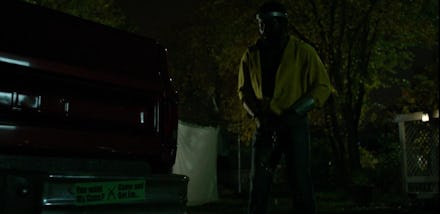Luke Cage comic: How the Netflix superhero's origin story compares to the original

As is customary with most Marvel superheroes making their debut on television and film, the hero's comic book origin story is eschewed, or modified, to fit the conventions of the new narrative. Such is the case for Netflix's latest Marvel series, Luke Cage, since the titular hero traces his comic roots to the '70s blaxploitation era in the industry. Netflix's Cage, meanwhile, exists in present-day Harlem.
But the Marvel series' origin story for Cage's upbringing — as well as how he obtained his superpowers — are quite similar, with a few notable exceptions. Here are the biggest differences between Cage in the comics and on-screen.
In the comics, Cage is originally from Harlem. The TV iteration of Cage comes to Harlem as an outsider, who gets to know the city through his wife, Reva Connors (she is killed prior to the events of Luke Cage and Jessica Jones by Jones under the influence of Kilgrave's mind-controlling powers). Cage comes from Georgia, the son of a preacher with a military and police background, before he's sent to prison. Cage is framed for a crime — but he was never a bad person.
The comic book source material puts Cage in a different light, however. He's from Harlem (and yes, he is framed for a crime that sends him to prison), but his early years were spent on the wrong side of the law. He's a street-level thug working for a Harlem crime boss, Hammer, and it's when he wants to get out of this life that he falls victim to a frame job.
In both arrests, he is framed by his close friend Willis Stryker, aka Diamondback. On the show, Diamondback is also revealed to be his half-brother and the series' main antagonist — a bigger leap for the character who has a shorter run in the comics after framing Cage.
His love interest, Reva Connors, works at Seagate Prison in the show. Cage is sent to the same penitentiary in the show and the comics: Seagate Prison, a fictitious, knockoff Alcatraz located off the coast in Georgia. The prison has been referenced a few times in the Marvel Cinematic Universe, though there aren't any crossovers between the prison flashbacks on Luke Cage and previous Marvel entries.
What's interesting, however, is the inclusion of Reva at Seagate in the show. She's a psychologist there, presumably working with prisoners with hopes of assimilating back into society when their sentences are up. But as Cage learns after her death, Reva acted as an early litmus test for which inmates would be subject to experimental procedures at Seagate — the way Cage obtains his indestructible skin and super strength. She highly recommends Cage for the tests in a video Cage finds after the fact.
Cage is devastated by the revelation, though it adds a layer of intrigue to Reva that isn't seen in the comics. In both cases, Reva is from Harlem, but she's tragically killed in the comics in an attempted assassination on Diamondback. It's devastating, yes, but she isn't as big of an influence on the plot. Conversely, the MCU Reva — and Seagate's potential influence on other heroes' superpowers, like Jones' and the now-deceased Kilgrave's — could continue to have an impact.
He doesn't have his absurd costume in the show — except for one scene. This probably doesn't come as a surprise, but Netflix's Cage doesn't walk around modern-day Harlem in his Power Man outfit — one with an open yellow shirt, blue spandex, a chain for a belt and metallic body wear.
However, the series did give a nod to the hero's original costume with a clever easter egg in the show's fourth episode flashback. After Cage escapes Seagate (immediately after the experiment gone wrong, in which he's wearing a metallic head brace and wristbands) he comes across a set of clothes that bear a striking resemblance to the original outfit. This iteration of Cage, however, wasn't as impressed with the look.
"You look like a damn fool," he tells himself.
Given the context of the present-day show —with its use of a black hoodie as Cage's defacto outfit as a powerful social commentary — most would agree it was a sensible choice by showrunner Cheo Hodari Coker.